

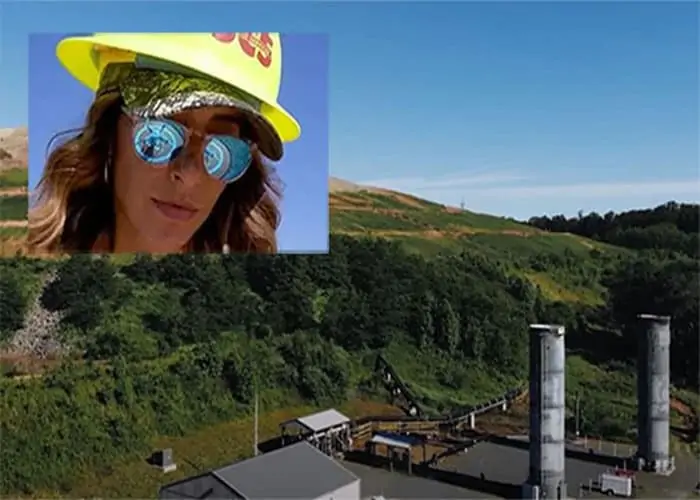
When Melissa Russo’s boss Phil Carrillo told her he thought she should get her drone pilot license, she thought he was kidding. At the time, she worked on SCS’s Remote Control (RMC) team; selling drone services was a part of her job, but she had not thought of flying these unmanned vehicles herself.
Her thirst for competition kicked in when he turned the proposition into a bet. He was going after his pilot license himself; she bet she’d beat his score. They finished in a dead heat, but what started as friendly rivalry ended up bringing a new dimension to Russo’s job— a job that continues to expand in breadth as new opportunities turn up.
Today she not only flies, sells drone services, and teaches others how to sell and fly, but she’s helped bring geographical information systems (GIS) into RMC’s portfolio. How these technologies fit together is RMC remotely collects data from drones and different landfill systems. Then the GIS translates that data into maps, capturing a visual picture of how clients’ facilities’ systems are performing. The GIS piece is one of the latest chapters in the story of Russo’s evolving role (more to come on that).
Piloting is what especially gets her juices going.
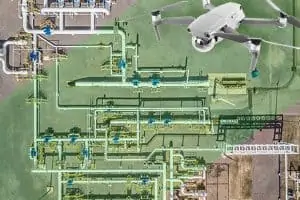
“I love working with my team, supporting them in what they do. But when it comes to drones, I like the hands-on experience of flying myself more than telling other people how to do it.”
She controls these small aircraft from a device on the ground, sharply focused on her surroundings while keeping the drone in her sight at all times.
“You have to make sure there are no manned vehicles around; they have the right of way. And there’s a lot of continuous movement on landfills. You’re constantly aware of your surroundings. Is a truck coming? Am I in line with where dumping is going on?”
Flying drones takes muscle and mechanical aptitude.
The drone and case can weigh 45 pounds. And there are a lot of moving parts to assemble and calibrate.
Sometimes it’s manual work, pointing and rotating a remote controller to send a radio signal to tell the drone what to do. But more often, she pilots automated flights that she maps in advance and uploads the flight path specs into software that interfaces with the drone.
“When I’m flying drones, I can access areas where if I had boots on the ground, I couldn’t. I can go and explore just about anywhere, similar to when I dream— only it’s real,” she says.
With any task, she’s laser-focused, concentrating on one part of the picture at a time to grasp the details. She steps back and uses critical thinking, accumulated knowledge, and imagination to take on what’s before her.
The innovation process
“We’re pretty lucky with our timing; new and proven technologies are emerging quickly. I’m one of many SCSers with a deep knowledge of technology and practical experience in the solid waste industry. Together, we can make a difference because we understand the business and operational challenges very well. When I need an expert in another industry, I just reach out to a colleague. The learning process never ends, and each project helps me and my team constantly find better answers.
“My boss is more of a big-picture person; his ideas are huge and amazing. He comes to me with new ideas, and I figure out how to make them work and implement them,” Russo says.
She points to his idea to use proven GIS technology within RMC. She was already using GIS to map methane data, process topographic maps, and stockpile calculations. For instance, she integrates methane values into the GIS and overlaps them with imagery so her clients can zoom in on one well or get a large-scale view of the overall health of the gas collection system. But integrating GIS in new ways to incorporate multiple landfill systems would solve some expensive problems and, better yet, prevent even more expensive mitigation and repairs.
Expanding GIS applications to illustrate multiple landfill systems
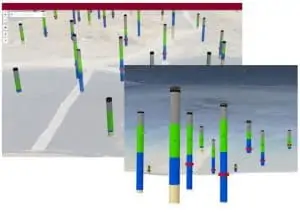
“I know drones and how to process drone data. But now that we are expanding applications, I add more layers of landfill data, such as liquids, soil, the gas collection and control system (GCCS), SCADA, and surface emissions, to bring them into the RMC GIS platform. My colleagues are demonstrating these technologies at the SCS June Client Webinar.”
“I created a team of hand-picked SCS staff with both GIS and waste management backgrounds (and a whole lot of drive) to make the vision come to life,” she says. “That’s how we innovate, tight teams with access to nationwide expertise.”
Within six months of the project’s genesis, Russo and her team had integrated gas and liquid collection systems, other landfill systems, and asset management into the RMC GIS platform. She and her team now sell these applications nationwide.
Russo’s come a long way since joining SCS at age 21
In her mind, she grew up at the company. Before coming on board, she managed a shop in Manhattan Beach, California, while she began thinking about what to do next.
“I learned a lot about business and people. It was a stepping-stone – I discovered how to earn trust, build rapport, and sell. But in time, I decided I wanted a more professional job,” she recalls.
She went to work for a real estate company managing the SCS Engineers Long Beach office, where she would soon take an entry-level Accounts Payable position in SCS Field Services.
In time, she transitioned to the Health and Safety group, assisting in creating training material and managing truck fleets. Soon she was managing assets, among other firsts for her. By this point, she had developed enough software, accounting, and other administrative skills to step up fast.
Part of the job was keeping up with vehicle maintenance, so she often spoke with field staff. Many of them she already knew from her days working in the accounting department.
Growing with her SCS colleagues
“When I was in my first administrative roles, I supported many colleagues who were field techs or supervisors; they are project managers now. It feels as though we’ve grown up together, and we know and trust each other. We collaborate well and know that when we bring projects to each other that we will take care of each other,” Russo says.
She especially likes the RMC concept because remote control and automation enable her, her clients, and her team to work smarter, not harder because they leverage the technology to work for them.
“That means we can usually work from anywhere, giving all of us more time for family, friends, or allocating the time saved towards other needed to-dos. I’m up at five a.m. and, at times, may not finish work until nine at night. Somehow, us working women find the balance in between meetings, writing proposals, and answering emails; I have lunch with my two boys or take them to a park,” she says.
Bambi Lance, a veteran SCSer and her mother, works in the same business unit as Melissa does. “Mom’s been here for 16 years, and it’s interesting to have her perspective not only as my mom but as someone who knows SCS. She knows my department, and she knows me. She sees what I am doing and she along with management encourage me to do more and believe in myself.”
Russo reflects again on the concept of stepping-stones on the way to knowledge and maturity. I’m competitive and take on challenges, which has been a driving force in all I do today. It’s helped me take a personal inventory of how I am now versus the young Melissa,” she says.
She uses it to gauge her direction. And she uses it to connect to her staff. “I try to help them see you can turn almost any experience, into a positive. I want my team to see we are all learning and growing. They can, as I can, comfortably bring new ideas to the group and company, which often turn into new ways to help clients.”
She circles back to her decision to fly drones, explaining how it aligns with her career path from her first steps to today. “Becoming a pilot was a natural fit because it’s a new challenge. The craving to take on new tasks is how I grew from an accounting administrator to a project coordinator up to a business manager. It’s wanting to expand my knowledge, tackle new feats, and accomplish what I was not sure I could do. I like the challenge.”
The SCS Culture is Driven by Client Success
David Hostetter, Sam Rice, Joy Stephens, and Chris Woloszyn take us on a landfill technology journey in their recent EM Magazine article. It is amazing what these YPs are developing and implementing nationwide. The future looks bright!
Most equipment data and system data are collected manually for regulatory compliance; this process is time-consuming, expensive, and sometimes dangerous. Consequently, some sites only collect a few data points per day, which may not provide a complete picture of landfill operations. They also contend with the control and maintenance of remote equipment. These YPs explain how they’ve solved these challenges using RMC and SCADA systems.
Field technicians—heavily laden with instruments, printed data collection sheets, logbooks, clipboards, maps, and other gear—spend long days collecting immense amounts of data. Additional labor awaits supervisors and managers as they transcribe, digitize, or otherwise prepare the data for analysis. This team deciphers the information recorded on sheets and logbooks, often accompanied by leachate stains, mud spatters, and water damage. GIS provides a low-cost way to streamline data collection, track progress, visualize task completion, and analyze collected data to deliver an overview of the landfill’s status.
Beyond cameras, various sensors can be attached to a drone. These sensors range from infrared cameras to LiDAR sensors to gas identification tools. One such tool helps identify the presence of methane leaking out of a landfill. A drone pilot can maneuver over the entire landfill, sniffing out methane leaks and seeking out poor landfill-cover integrity, all in a matter of hours. Drones collect methane data quickly and accurately without the need for traversing the ground on foot or by vehicle.
Integration of additional automatic and manual data collection methods, such as quarterly or annual drone flights, RMC systems, and remotely monitored and controlled wellheads, provide a comprehensive view of landfill performance and overall condition. UAVs or drones allow for safe inspections, quick data gathering, and lower operating costs.
Read EM Magazine’s full article with images here.
SCS is also providing a non-commercial webinar on drone technologies providing the best return on investment in March 2021. View the recording in our Learning Center after March 24, 2021.
Our industry is in a period of a rapid transition to digital data management, but particularly on landfills. Often you read that the latest technology, whether by a brilliant programmer or rolling out as part of a takeover, is innovative. Linking technology and innovation is becoming commonplace, but they are not the same. Innovation is a human process requiring experimentation and iteration to solve landfill issues that often have nothing to do with computers or mobile phones. Landfill technology or apps are tools.
Innovation takes a team of diverse expertise, different perspectives with a constant desire to learn, and most importantly, the primary desire to make landfill operations more efficient and safe. Innovators use technology when and how it makes sense to improve environmental management, profitability, and care for employees and the local community. Lower cost solutions for the vast amount of data collection completed faster and without human error come from people with hands-on in-the-field experience. When it comes to landfill technology, its value is clear when a landfill practitioner demonstrates how the particular technology fits into a solution. The nice part is they also get to the point and skip the tech-speak and jargon.
The Landfill Technology Evolution Started Here in 2003
Back in 2003, SCS couldn’t find technology that would enable our engineers and technicians to support landfill operations as we desired. Proving the proverb “necessity is the mother of invention,” we developed a database for our use. Its value in the field was immediate, and SCS continued to adapt and develop SCS DataServices® and SCS MobileTools®, basing refinements on each landfill and client need. It took people in the waste industry to make the right technology tools for the industry.

Meet Oliver Early, SCS’s DataServices and MobileTools Product Manager. Oliver started his career managing landfill operations. He became interested in technology because it got results for him as a landfill manager of 15 facilities. By combining a comprehensive investigation of physical landfill systems, such as landfill gas collection and control and other environmental monitoring and control systems with evaluations of compliance areas, he improved his landfill system performance and substantially increased power plant production. He used multivariate data techniques, including time series and network analysis, to scrutinize and refine results. Merging DataServices capabilities under Oliver’s guidance took SCS’s original internal database to a timesaving product for all landfills, not just the landfills SCS operates.
The platform, called SCS eTools®, includes modules for leachate, groundwater, DataServices, and the newest application SCS MobileTools, free for those using DataServices. The technology is currently in use on over 630 landfills nationwide and benefits all of SCS’s design, build, and operations work.
For example, if methane readings at a gas probe are elevated, that’s an indication of a potential LFG migration issue. While expertise is great – it could take hours to diagnose and mitigate. With DataServices, you could run an evaluation of the existing well field in a few minutes, ruling out issues with current wells. With the touch of a button, you can share the information with your team and focus on potential mitigation recommendations.
Remote Monitoring and Control Technology Didn’t Happen Overnight Either
The best and most innovative solutions come from combining the stakeholders’ experiences and thoughts. Let’s meet a few of the people who lead other landfill innovations.

In addition to being a licensed drone pilot herself, flying over 100 landfills, Business Manager Melissa Russo uses SCS Remote Monitoring and Control (RMC) technology to support her landfill clients. Her contributions increase safety and lower environmental risk using unmanned aerial vehicles to gather field data at a lower cost. Melissa developed SCS’s national drone and geographic information systems (GIS) programs to respond to her clients’ needs for expensive regulatory and operating challenges. As a result, capturing more (methane) greenhouse gas instead of releasing it into the atmosphere provides the obvious environmental benefits, and landfill personnel have better and safer working conditions.
Depending on the sensor or camera attached, her pilots can monitor methane concentrations using a tunable diode laser, measure and map surface temperatures to mitigate elevated temperature conditions, or create topography, aerial imagery, and estimate filling volumes. Operators can view, detect and measure changes over time, gaining insight into critical infrastructures such as water infiltration, liquid flow, and vegetation distributions. Melissa’s use of GIS provides a low-cost solution to data management and sharing between field and office.
Melissa is an innovator who genuinely cares about our industry, taking the time to listen and truly understand her clients’ challenges and long-term goals. Only then does she devise customized solutions, regardless of whether it uses technology or not. See Melissa at work.
The Internet of Things (IoT) is Bang for Your Buck

SCS RMC’s Business Manager is David Hostetter. His experience includes remote monitoring and controls systems engineering, construction, and operation; landfill gas and leachate engineering; and mechanical engineering. Dave’s focus is on automating remote process control of landfill systems, landfill gas blower/flare stations, wellfield vacuum and flow, along with leachate and groundwater pumping systems, weather equipment, and air monitors.
As a landfill gas engineer, his impetus was to avoid production downtime and keep operations within regulatory mandates. He wanted his clients to see what was happening at any given time and be alerted to atypical conditions. As a landfill engineer, he knows that “prevention is better than cure,” as long as it’s cost-effective. Dave’s solution is to leverage the Internet of Things through SCS RMC systems. Each piece of equipment you want to monitor gets a sensor. His team configures each sensor or group of sensors to parameters based on his operator’s business needs and environmental reporting responsibilities. A local wireless network communicates with a base station providing continuous readings from each sensor.
RMC sends alerts if readings are outside an acceptable range or if an environmental threshold is nearing exceedance. Alerts go to the landfill’s designated staff or technicians via smartphones, computers, or tablets. From these devices, users access their interface to control, start, stop, and reset field systems and analyze system operation. They can also view data, graphs, tables, alarms, and reports.
That’s more than convenience; it saves labor dollars spent to diagnose and reset these systems and is especially valuable for remote landfills. By design, clients can enable custom authorization levels for their systems. Naturally, the analytical tools are easy to use, understand, and report, as he explains in his video.
Albert Einstein Said…
“You can’t solve a problem on the same level that it was created. You have to rise above it to the next level.” We’re not comparing ourselves to Einstein, but all three SCSers leading their teams know that compliance policy never stops changing, and landfills are unique beasts made up of complex systems that need balance to perform. Performance is based on daily decisions and landfill readings generating enormous amounts of data. SCS’s job is to make your job better by collecting those millions of data bits for analysis faster, helping landfill operators use the intelligence to identify the cause and appropriate response to hundreds of issues that are part of landfill or facility management.
The backbone of every service at SCS Engineers is to design and develop based on our clients’ specific needs. As innovators, our mission is to leverage proven technology to meet those needs. As our founders did, we strive to understand our clients’ current and future needs, then develop or integrate the appropriate technology to meet those needs.
SCS is one of the most experienced and successful environmental compliance, design-build, operations, and maintenance firms in the United States. No stand-alone technology company can substitute for our knowledge and hands-on experience with innovative landfill design, build, and operations.
Visit SCS Engineers to discover SCS eTools and SCS RMC capabilities. You’ll find case studies, technology awards, and more resources for using technology to manage labor, liquids, air monitoring, groundwater, volume, GHGs, and more
“An ounce of prevention is worth a pound of cure.” We’ve all heard that proverb before, and it’s true – it’s generally easier to stop something from happening than to repair the damage after it has happened.
This is almost always the case when it comes to environmental incidents – it is cheaper to prevent the incident from occurring than paying for the cleanup and impacts the incident caused. Many of SCS’s service areas are specifically focused on prevention and optimization – doing the job in ways that are better, safer, and more protective of human health and the environment.
Environmental insurance is a product that most SCS clients likely have in place in some form to protect their facilities, employees, and neighbors from the harmful impacts of incidents that can introduce contamination into the air, soil, groundwater, or surface water. The types of coverage provided by environmental insurance policies vary in both extent and cost, and many factors, one of which being risk, drive those costs. When an insurance company is underwriting coverage for a new or existing client, the risk associated with that coverage is carefully evaluated. What the client (insured) does, how they do it, their safety record, their history of previous environmental issues, and other factors are all taken into consideration when writing an environmental insurance policy and the associated premium and deductible are determined.
To reduce the up-front costs (the premium) associated with carrying the necessary and appropriate amount of environmental insurance, the insured can do several things. One is to increase their deductible, but in the event of an incident, that could end up costing the insured more on the back end (i.e., costs expended to investigate and remediate an incident). Insureds, their brokers, and the insurers will work closely to balance premium costs and deductibles so that the costs associated with addressing an incident are not detrimental.
An insured shouldn’t reduce the type and amount of coverage – that could put them in a bad financial (and legal!) position. A more prudent choice, one that has many potential positive aspects and makes sound business sense, is reducing risk and therefore the costs associated with an environmental insurance policy that is based on coverage and risk.
SCS Engineers develops proprietary remote monitoring and control software for landfills, manufacturing, and industrial facilities called SCS RMC®. The software provides remote real-time viewing, analysis, and control of equipment and systems critical to safe operations and production. A network of sensors and Machine-to-Machine (M2M) applications enable operations teams to be alerted immediately (via cell phones, computers, tablets) of any operational issues that could potentially result in an environmental incident.
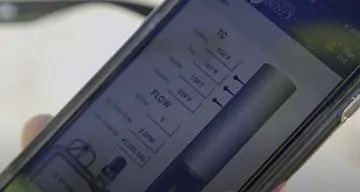
The application reduces reaction time, labor costs, and potential associated impacts. In this case, SCS RMC® puts the client’s decision-making in front of a problem rather than reacting to potential aftermaths, proactively reducing the potential environmental risks of their operations.
SCS’s service areas, including those listed here, are particularly focused on providing our clients with assistance in designing, building, and maintaining sustainable solutions, reducing risk, and helping to foresee and adapt to environmental, social, and regulatory changes:
SCS’s professionals are available to assist our clients in their discussions with brokers and insurers regarding how our environmental services and technologies can potentially reduce risks associated with their operations. We do this by providing creative and cost-effective solutions and guidance that can prevent environmental incidents from occurring and reducing the nature and extent of associated impacts.
We can help you select and implement the “ounce of prevention” so that you won’t have to face the “pound of cure.” This will proactively reduce operational risks, which can, in turn, help facilitate the positive brokering of more favorable environmental insurance coverage, premiums, and deductibles.

San Bernardino County’s almost 500-acre San Timoteo landfill upgraded with gas monitoring and controls that manage its four blowers, flare station, pumps, valves, thermocouples, and other devices. There are 340 tags, 16 screens and more than 50 alarms monitored and managed by web-based SCADA software. Simpler, streamlined SCADA is more capable and closely connected, and less costly for landfill gas monitoring and control.
San Timoteo added options such as 3D imaging from flying drones and augmented reality (AR) displays. After flying the site, the imagery is uploaded to update its map and create point-cloud graphics. Aerial data is used to create topographic mapping, 2D images, 3D renderings, and GIS, thermal and tunable diode laser (TDL) images for methane leak detection.
Landfill operators and managers can remotely view the site using a mobile device, and “walk the site” from their offices or anywhere using the HoloLens.
Now nearly all landfills can afford to gather data with Ethernet and wireless networking, analyze data with sophisticated software, and display it on ubiquitous interfaces including tablet PCs and smartphones. The trick is applying the technologies in applications that enable more effective decisions.
Read the article in Control Magazine.
Watch a quick video at San Timoteo.
Inductive Automation® announced the software firm now recognizes SCS Engineers as a Premier Integrator. Premier Integrators have a high level of commitment, professionalism, and competency using the Ignition software. They must consistently produce high-quality work and must consistently demonstrate successful projects with very satisfied end-users.
SCS uses Inductive Automation’s Ignition supervisory control and data acquisition (SCADA) software in their solution because it is a proven state of the art software, which works well with cloud-based systems and the internet of things (IoT). It allows clients to easily control, track, manage and report on their processes.
Large landfills, counties with multiple landfills, and private waste management firms have been waiting several years for SCADA software to catch up to their business needs. Landfill operations are extremely complex and expensive since they monitor and manage multiple systems to protect the public from contamination to the air, water, or soil. There are typically multiple operations active on many sites, such as waste recovery, recycling, composting, Gas Collection and Control Systems (GCCS), and renewable energy plants.
SCS Remote Monitoring and Control®, or SCS RMC® provides a next-generation option to monitor and control systems, and see the data collected and the systems in action. It allows users to control their systems remotely, collect data and use the data to enhance their productivity, reduce their operations and maintenance (O&M) costs, and reduce their environmental risk. Other offered services include 3D imaging from drones and virtual reality (VR). SCS uses aerial data collected via drones to compose topographic mapping, 2D images, 3D renderings, GIS, thermal, infrared (IR), and methane leak detection for waste facilities. The SCS RMC® team can take rendered models and apply them into virtual reality (VR) headset as well, which allows decision-makers at waste management facilities and organizations to “walk the site” from anywhere.
Current clients save Operating & Monitoring (O&M) costs and reduce human error by generating internal and regulatory reports automatically, using data automatically collected by the system. They can also receive instant notification of malfunctions and can troubleshoot these notifications remotely.
Not only for landfills, until recent years the public did not realize the long-term value of recycling nor the associated costs. Some clients use SCS RMC® to monitor dumpsters and recycling receptacles for collection. This helps keep waste and recycling inside the container, collection schedules more efficient, and overall operations less costly.
Manufacturing, industrial facilities, and ports use remote monitoring and control for real-time viewing, analysis, and control of equipment and systems critical to production and safe operations, often for air monitoring.
Galen Petoyan, Senior Vice President of Field Services states, “We fully embrace SCS RMC® within SCS Field Services® because the software allows us to provide more value to our clients; our technicians and engineers can avert problems, and when needed, provide rapid, efficient, and accurate analysis and action.”
To support the growing use of technology by municipalities, in waste management, and by industrial and manufacturing clients, SCS Engineers is opening new offices. The newest office is in Lancaster, Pennsylvania. The office provides environmental engineering, consulting, and is the base for the east coast SCS Remote Monitoring and Control® (RMC) professionals.
The office is the third SCS location in Pennsylvania, and is located at:
SCS Engineers
1861 Charter Lane
Suite 107
Lancaster, PA 17601
Tel: +1-717-550-6330
SCS RMC® works closely with the firm’s business sectors developing software, applications, and support services, which harness technology to capture, track and evaluate environmental data, provide remote monitoring and controls, and drone services with advanced capabilities.
The SCS RMC® platform and applications help public and private clients control their equipment remotely, collect data and use the data to enhance their productivity, reduce their operations and maintenance costs, and reduce their environmental risk. The tools are versatile; SCS programmers, engineers, and scientists are available to develop custom applications meeting a spectrum of industrial environmental objectives for groundwater, leachate, air monitoring, and landfill gas management.
SCS RMC® uses a network of sensors and Machine-to-Machine (M2M) applications to help minimize equipment downtime by alerting staff to maximize production or to an operational safety issue. The system supports additional monitoring components as operations grow, providing facility owners and operators with a single secure application for their supervisory control and data acquisition (SCADA), data management, and reporting needs.
SCS RMC® is experiencing exponential growth, as industrial operations need technology most when reaction time is essential to avoid production downtime and continue operations within regulatory mandates to maintain public safety standards.
To discover how these and other next-generation technologies can support your operations, contact SCS at , or use the links below to explore:
The Ignition Firebrand Awards recognize system integrators and industrial organizations that create innovative industry solutions.
SCS Engineers and partner Corso Systems jointly received a 2019 Firebrand Award yesterday at the annual Ignition Community Conference. The firms won recognition for their next-generation visualization and control system for landfills.
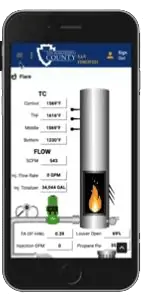
After flying the San Timoteo Landfill, uploading the imagery, and mapping the facility, they embed both the 2D images and 3D rendering into Perspective. The team can take those rendered images and apply them into a Microsoft HoloLens VR headset as well, which allows decision-makers at San Bernardino County to “walk the site” from their offices. Now, landfill executives and operators can view their sites remotely from any device, anywhere. Other benefits include:
The firms and SCS RMC® have received a tremendous amount of positive feedback. SCS RMC® is now rolling out similar solutions at more landfills, for pipelines, and other industrial applications. A video on the 2019 ICC Award website explains how the system works and what landfill owners and operators can expect.
Well done and congratulations on providing superior client service!
Do you glaze over when the tech-speak starts? In our blog, we’ll try to prevent that from happening while describing new technology for landfills and industrial use. We’ve merged our SCS Engineers technology with some new web-based technology that will make your landfill, facility, or plant safer for workers and help lower operational costs. Not only that, with SCS Dataservices® (already on over 600 landfills) you will have a complete and accurate record at your disposal.
You can find information on our website, but here we describe the most exciting new Remote Monitoring and Control (RMC) options:
SCS owns a small fleet of no-crew aerial vehicles (UAVs) and employs licensed UAV pilots nationwide. The use of UAV technology, commonly known as drones, can produce photogrammic and aerial photographic imagery offering site owners and operators the ability to take measurements from photographs, especially useful for recovering the exact positions of surface points quickly and efficiently. Some of the benefits of UAVs are:
SCS deploys UAV technology on a case-by-case basis as an adjunct to our RMC® services. We also offer to consult and training on the implementation of UAV programs at solid waste and other facilities.
SCS can also present real-time data in mixed reality environments (e.g., Microsoft HoloLens2). Augmented 3D facilitates the difficult task of visualizing actual and conceptual site conditions. Another application of reality technology includes analyzing landfills in more than three dimensions by combining multiple datasets. These 4D models enable operators to view conditions over time, providing the ability to detect and measure changes and insight into the benefits of critical infrastructure such as earthworks and systems. One could add costs as a 5th dimension to visualize the resources, time and money needed to move solid materials.
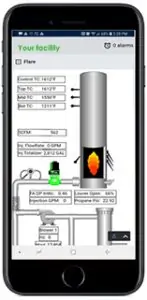
The SCS RMC® team integrates web-based technology called Ignition 8 into our client solutions. An Inductive Automation product, Ignition 8 enables us to build dynamic industrial applications that automatically respond to each client’s unique perspective.
Ignition Perspective enables us to build full SCADA, HMI, and alarm systems, and provide clients with a mobile view of their operations via smartphones and other mobile devices. Full-control of industrial processes is more mobile, customizable, scalable, and secure than ever before. For example, one of our clients uses advanced SCS RMC® – Ignition Perspective HTML 5 integration for remote access and control of piping and instrumentation diagrams that stream live sensor data. The application reduces O&M costs by:
Read Waste Today’s article Using Drones for Landfill Monitoring to learn more.
On October 11, SCS Engineers’ David Hostetter and Phil Carrillo present several case studies during the webinar demonstrating how Remote Control Monitoring (RMC) has lifted the burden of data collection and facilitates the review and analysis of data for use in decision-making.
In this webinar, several case studies regarding remote monitoring and control (RMC) systems for landfill gas and leachate systems will be presented. This includes a description of integrated systems which are used for data collection and analysis and how they were used to identify, troubleshoot and solve real problems in an effective and efficient manner.SCS recognized this as an issue in the industry and developed systems to streamline the process using the latest technology to help perform routine, sometimes complex, data analysis, and to automatically push reports and alerts to operators, engineers, and project managers. This has been a dramatic change that removes human error while reviewing pages of data and allows people to focus on what really matters.
RMC systems give the ability to:
Watch Dave’s video here: https://www.youtube.com/watch?v=pYezcobr1Cg
Dave explains how landfill owners/operators use SCS RMC® to view, operate, and control field equipment. The presentation covers how SCS RMC® helps to reduce operating costs – sending technicians to respond when necessary to alerts from flare systems, leachate systems, and air quality sensors. SCS helps manage all field resources and personnel better while enhancing reporting and data management too.